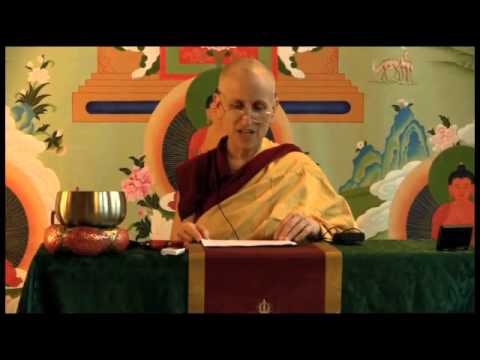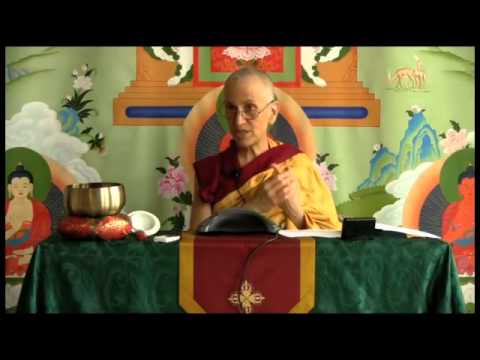Dedication and self-acceptance
A Crown Ornament for the Wise, a hymn to Tara composed by the First Dalai Lama, requests protection from the eight dangers. These talks were given after the White Tara Winter Retreat at Sravasti Abbey in 2011.
- Dedication and review
- How the afflictions arise one after another in our minds
- Importance of being able to identify and admit our afflictions
- Developing self-acceptance and being comfortable with who we are
The Eight Dangers 22: Conclusion (download)
So we finished about doubt. And so here’s the dedication part. It says:
Through these praises and requests to you,
Quell conditions unfavorable for Dharma practice
And let us have long life, merit, glory, plenty,
And other conducive conditions as we wish!
So that’s the dedication verse after we’ve been requesting Tara for her inspiration to deal with these various dangers. Okay?
So to review what they are:
- Our favorite—the lion of pride
- The elephant of ignorance
- The fire of anger
- The snake of jealousy
- The thieves of distorted views
- The chain of miserliness
- The flood of attachment
- And then, the carnivorous demon of doubt
They’re in How to Free Your Mind. And it’s a very beautiful requesting prayer from Tara.
One thing that is in common with all those afflictions that we’re requesting Tara’s help with is that they arise in our minds one right after the other. Don’t they? And we often like to think of ourselves as very accomplished practitioners and spiritual people, don’t we? We’re not like the rest of those people out in society who are so greedy, who lie, who have addiction problems … you know, the politicians, the CEOs …
We’re not like those people. We’re not like the people who are on automatic, just going through their lives any old way, seeking pleasure. We are holy spiritual people. We’ve been practicing so long, you know. Three months. [laughter] Maybe three years. Even 30 years. You know? But we’re very holy. We’re very realized. Almost bodhisattvas, but maybe by next week. But yet all these afflictions are coming in our minds, one after the other.
So there’s some discordance here. Yes? But we don’t like to acknowledge that there’s discordance. We’re kind of caught up in our image. And we like to think that way of ourselves, that we’re very holy. And we like to portray that image in front of other people, too. Create that, “I am somebody who can teach you the Dharma. Just follow me.” You know? And yet our mind is bonkers. Our mind is crazy.
And so it’s hard to admit that to ourselves. And it’s embarrassing to admit it to others. And so we often just totally block it out and say, “Oh, I’m fine.” You know that one? You’re talking to whoever you’re working with, and [sounding angry] and the person you’re working with says, “It sounds like you’re upset.” “NO I’m NOT upset!” [laughter] That’s how we are. Aren’t we? “I’m not upset! You’re projecting YOUR stuff on ME! Leave me alone!” [Looks innocent] Because we’re very spiritual practitioners. [laughter] So we don’t get upset. So there’s nothing to acknowledge. You know?
But, you see, this is the thing about living in community. Everybody knows we’re upset, no matter whether we say we aren’t or not. And when we’re greedy, everybody knows that we’re greedy, whether we admit it or not. Sometimes we’re the last ones to know. [laughter] Everybody else knows very well. “Oh, so-and-so has a problem with jealousy. So-and-so has a problem with arrogance.” Those people have no idea. Comes as a big surprise. Sometimes you’re doing retreat and, “Oh! I have a problem with jealousy.” And then, of course, the whole community knows that. What took you so long? But this is the way we are, isn’t it?
So it’s sometimes a very very humbling experience to have to admit that we’re just kind of like everybody else. We want to be happy. We don’t want to suffer. Our mind’s filled with rubbish. And we’re so fortunate we’ve met the Dharma. But it’s a very humbling experience to admit that. But it’s a very important thing that we do that. And this is the kind of transparency that we create in community. Because you can’t hold on to your trips too long. Well, we try. But, you know, our trips kind of get busted up by living in community, because there’s nowhere we can go to hide. When you live on your own you can go somewhere to hide. But when you live in community … especially when it’s snowing outside. Where are you going to go to hide? You know? You can’t stay outdoors in the snow too long. In the summer, maybe it’s easier. But you know, eventually you have to come in here for food.
And so it’s this thing of becoming comfortable with who we are. Yes, we’re imperfect beings. Yes our minds—we lose it sometimes. And we have afflictions. And that’s okay. Everybody knows it. We can admit it. There’s nothing to be ashamed of. It’s just what reality is. Isn’t it? So we admit it. And then that can bring a lot of self-acceptance. And the self-acceptance is one of the key things we need to start remedying our afflictions and applying the antidotes to our afflictions. Because if we don’t accept that we have them, and we don’t accept ourselves for having them, then we’re not going to be open to applying antidotes, because we think we don’t need to. Because of course, it’s everybody else’s fault. That’s a given, isn’t it?
So you know, just kind of, coming back to our humanness. You know? And just being who we are, and admitting it, and feeling okay with it. And working on it at the same time. And so it’s all very human. It’s very normal. And I think the bodhisattva practice has to be very human and very normal in that way. It’s not about being some exotic person who radiates light in the atmosphere, who everybody sees and falls to their knees in front of [with palms together]. Of course, in the sutras the bodhisattvas may be depicted like that, but they’re in the pure land. You look at the example of His Holiness the Dalai Lama, and that’s not the way he is. He’s just very normal. Very normal. And feels completely comfortable with it. So this is kind of a model for us.
Venerable Thubten Chodron
Venerable Chodron emphasizes the practical application of Buddha’s teachings in our daily lives and is especially skilled at explaining them in ways easily understood and practiced by Westerners. She is well known for her warm, humorous, and lucid teachings. She was ordained as a Buddhist nun in 1977 by Kyabje Ling Rinpoche in Dharamsala, India, and in 1986 she received bhikshuni (full) ordination in Taiwan. Read her full bio.


